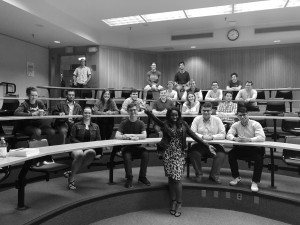“Nothing stops a bad guy with a gun except a good guy—or girl—with a gun.”
This is, in short, the summary of Antonia Okafor’s May 10th speech and discussion. Okafor—2nd Amendment supporter and campus carry advocate—visited Dartmouth on May 10th. She discussed her defense of the 2nd Amendment and argued for increased student involvement on gun rights issues. Antonia is a graduate of UT Dallas, a Campus Reform correspondent, frequent political commentator, and founder of EmPOWERed, an organization of conservative women in favor of gun rights.
The Dartmouth College Republicans sponsored the event. Even though Antonia had just finished attending the NRA convention, she put in the effort to come almost straight to Dartmouth.
The event kicked off with a recorded TV debate between Antonia Okafor and Piers Morgan, followed by a fifteen-minute prepared speech and a thirty-five-minute question-and-answer session with the audience. Antonia’s Dartmouth Coach got stuck in traffic and made her about 30 minutes late for the event, and she proceeded to open her talk by thanking Dartmouth College for hosting her, and “I know I’m late, but you guys can’t say anything, because I’m black,” to laughter from the audience.
Antonia briefly discussed her work with EmPOWERed, a gun rights organization geared towards “empowering millennial women to defend themselves,” particularly on campus. She argued that the founding principle of the 2ndAmendment is that an armed populace is a deterrent to government overreach. In the wake of the Parkland shooting and other similar tragedies, Antonia said, we have “seen the best of American society” as the country has come together in support of the victims of mass shootings, but we have also seen legal gun owners vilified as if they are mass shooters themselves. It “is a misguided idea,” she says, to assume that fewer guns will reduce gun-related violence. “The fewer guns there are, the easier it becomes for evil people to commit crimes.” Antonia pointed out that more than 96% of school shootings since the late 1990s have occurred in gun-free zones. While the gun-free designation was designed to make schools a safer place, “it has failed to protect students too many times.”
She also stated that guns are used “as many as 2.5 million times a year in self-defense,” many times more frequently than they are used to take a life. One of the classic pro-gun arguments is that disarming law-abiding gun owners will do nothing more than leave those law-abiding citizens vulnerable to criminals. Antonia brought this up, and told several stories from recent years in which a “good guy with a gun” was able to stop a shooter and save lives.
Antonia transitioned to the issue of campus carry with an anecdote about a girl at the University of Las Vegas, who was kidnapped and sexually assaulted, and managed to escape by grabbing her assailant’s gun. “If the victim was allowed to carry her firearm, she could’ve defended herself,” Antonia said, challenging listeners to consider the potential for legal campus carry to empower women. Texas, Georgia, Arkansas, and Kansas, she said, have already instituted legal concealed carry policies on college campuses, without incident thus far. In fact, within six months of it going into effect at the University of Kansas, the campus saw a 13% decrease in crime—”which comes out to roughly one hundred fewer criminal offenses.”
After the campus carry discussion, she attacked Florida’s decision to pass a law raising the minimum age for firearms purchase to 21 years old. “This is not only a mistake,” she said, “but a direct attack on our right to self-defense.” To her, the Florida state legislature’s action leaves law-abiding people vulnerable to attack while doing nothing to prevent criminals from committing crimes.
To conclude, Antonia offered a personal justification of her positions. As a woman, she supports the right of other women, “many of whom, like me, have experienced the horror of sexual assault.” Those women could have defended themselves more effectively if they’d been armed, and other women will be able to in the future. And “above all else, as an American,” she considers it her responsibility to stand up in defense of law-abiding citizens’ right to self-defense.
The question-and-answer session that followed lasted over twice as long as the talk itself. Asked how she would go about resolving differences that come from two people using different sets of facts, Antonia said that it’s important to bring personal testimonies into the conversation, because that will help “open doors” between differing people. Another person pointed out that she thought there was a misunderstanding in that most gun rights advocates think gun control advocates want to “take away” their guns rather than create safer regulations. Antonia brought up several prominent liberal intellectuals’ calls to repeal the second amendment, and said that while she personally does not think that the left is out to “get our guns,” she can understand why that misconception happens. When pressed about the risks inherent to having guns on college campuses, spaces where there’s inevitably alcohol and impulsive young adults, Antonia replied that those risks are the same risks that exist off college campuses in private homes, and asked why we should have a double standard for people of the same age based simply on whether or not they live on a college campus. Although there were disagreements, the tone of the Q&A period was polite, respectful, and open-minded.


Be the first to comment on "Review Reviews: Antonia Okafor Talk"